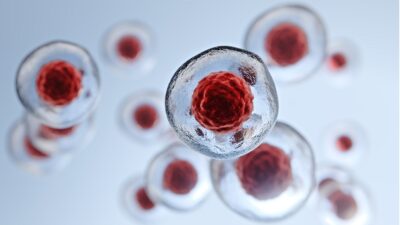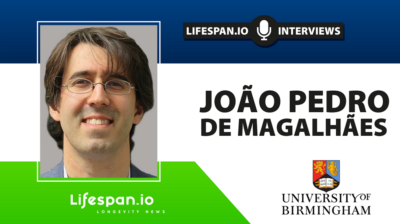Rejuvenation Roundup June 2025
- Interviews with key industry figures take center stage this month.

This month, in between reporting on new methods of affecting aging at its most basic levels, we caught up with AI developers and a longevity fund. Here’s what’s happened in June.
LEAF News
 Springtime for the Longevity Industry: If you are in the Northern Hemisphere, then spring is well underway and the weather is warming up. This is the season of renewal and growth. With that in mind, let’s take a look at what the Lifespan and LRI team has been up to.
Springtime for the Longevity Industry: If you are in the Northern Hemisphere, then spring is well underway and the weather is warming up. This is the season of renewal and growth. With that in mind, let’s take a look at what the Lifespan and LRI team has been up to.
Interviews
Rejuve.AI: Just Another App or a Longevity Research Network?: On its website, Rejuve.AI, a company co-founded by its dynamic CEO, Jasmine Smith, and a renowned AI researcher, Ben Goertzel, promises a lot of things: to “democratize longevity, globally,” to enable you to “take control of your data, and harness its earning potential,” and to “unite against aging.”
 Boyang Wang on Targeting Underfunded Longevity Projects: In this interview, Boyang Wang of Immortal Dragons discusses the kinds of projects he wants to fund, ways in which the industry can be encouraged to develop, relationships between the East and West in longevity research and development, and what got him involved in longevity.
Boyang Wang on Targeting Underfunded Longevity Projects: In this interview, Boyang Wang of Immortal Dragons discusses the kinds of projects he wants to fund, ways in which the industry can be encouraged to develop, relationships between the East and West in longevity research and development, and what got him involved in longevity.
Advocacy and Analysis
Longevity Policy, Advocacy in the Spotlight at Vitalist Bay: While the conference did not turn up huge crowds, it was an important first attempt to kick-start a discussion about how the longevity movement can take over the global agenda.
Research Roundup
 Blunting an Inflammatory Pathway Slows Alzheimer’s in Mice: Scientists have demonstrated that knocking out part of the cGAS-STING DNA-sensing pathway slows disease progression in a mouse model of Alzheimer’s, calming down microglia and protecting neurons.
Blunting an Inflammatory Pathway Slows Alzheimer’s in Mice: Scientists have demonstrated that knocking out part of the cGAS-STING DNA-sensing pathway slows disease progression in a mouse model of Alzheimer’s, calming down microglia and protecting neurons.
Educated ‘Night Owls’ Might Have More Cognitive Decline Risk: A recent analysis of over 20,000 middle-aged and older adults showed an association between a later chronotype (‘night owls’) and cognitive decline among highly educated people.
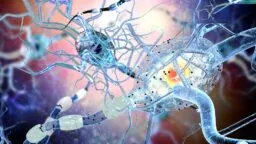 New Insights Into How Neural Stem Cells Age: Researchers publishing in Aging Cell have used single-cell transcriptomics to discover new insights into how neural stem cells (NSCs) change with aging.
New Insights Into How Neural Stem Cells Age: Researchers publishing in Aging Cell have used single-cell transcriptomics to discover new insights into how neural stem cells (NSCs) change with aging.
Younger Cohorts Show Less Dementia at the Same Age: While the overall prevalence of dementia might be rising due to population aging, a study has found that today’s older people seem to be less prone to dementia than in the past.
 Researchers Find Age-Modulatory Perturbations at Scale: Scientists have developed a new open source transcriptomic aging clock and published their work as a pre-print. The newly identified rejuvenating drugs and gene perturbations could be applied in regenerative medicine and longevity therapies.
Researchers Find Age-Modulatory Perturbations at Scale: Scientists have developed a new open source transcriptomic aging clock and published their work as a pre-print. The newly identified rejuvenating drugs and gene perturbations could be applied in regenerative medicine and longevity therapies.
New Study Could Pave the Way for Better Cancer Vaccines: Scientists have found that only about 1% of presented tumor antigens come from oncogenic mutations. The remaining 99%, previously overlooked, may offer better treatment targets.
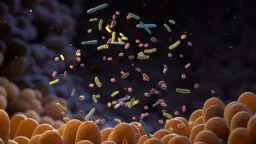 How Gut Microbiota Impact Endothelial Cell Senescence: In a recent study that included data from humans, mice, and cell culture experiments, researchers demonstrated that gut microbes and their metabolites can profoundly influence the senescence of endothelial cells.
How Gut Microbiota Impact Endothelial Cell Senescence: In a recent study that included data from humans, mice, and cell culture experiments, researchers demonstrated that gut microbes and their metabolites can profoundly influence the senescence of endothelial cells.
Preventing CRISPR From Causing Senescence: Researchers publishing in Cell Reports Medicine have taken a look at what causes CRISPR/Cas9 gene-editing technology to drive cells senescent and investigated a potential method of preventing it.
 A Popular Sweetener Adversely Affects Blood Vessels: A new study has lent more support to previous epidemiological data that ties the popular sugar substitute erythritol to elevated cardiovascular risk.
A Popular Sweetener Adversely Affects Blood Vessels: A new study has lent more support to previous epidemiological data that ties the popular sugar substitute erythritol to elevated cardiovascular risk.
A New Method of Modifying Stem Cells: Researchers have investigated a never-before-used method of transfecting senescent mesenchymal stem cells (MSCs) and published their results In the Cell journal Molecular Therapy Nucleic Acids.
 Financial Behavior Might Help Diagnose Dementia Early: By analyzing a large UK dataset, scientists have identified various financial behaviors that might point to dementia years before it leads to loss of financial capacity.
Financial Behavior Might Help Diagnose Dementia Early: By analyzing a large UK dataset, scientists have identified various financial behaviors that might point to dementia years before it leads to loss of financial capacity.
Longer Reproductive Spans Linked to Younger Brains in Women: Analysis of over a thousand postmenopausal women suggests that women with longer reproductive spans, earlier first period (menarche), and later menopause experience slower brain aging.
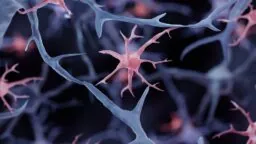 Engineering Microglia to Deliver an Anti-Alzheimer’s Drug: In Cell Stem Cell, researchers have described how genetically engineered microglia can be used to deliver therapeutic proteins to the brain.
Engineering Microglia to Deliver an Anti-Alzheimer’s Drug: In Cell Stem Cell, researchers have described how genetically engineered microglia can be used to deliver therapeutic proteins to the brain.
Senolytics May Treat Some Long-Term Viral Lung Damage: In Aging Cell, researchers have published their findings that mice exposed to influenza experience long-term consequences that can be partially ameliorated with senolytics.
 Lipid Metabolite Rejuvenates Muscle Stem Cells in Mice: A recent study investigated the effect of a single treatment of prostaglandin E2 on improving muscle strength and rejuvenating muscle stem cells in mice.
Lipid Metabolite Rejuvenates Muscle Stem Cells in Mice: A recent study investigated the effect of a single treatment of prostaglandin E2 on improving muscle strength and rejuvenating muscle stem cells in mice.
Targeting an Inflammatory Pathway Fights Alzheimer’s: Scientists have discovered that a rare mutation protects against Alzheimer’s disease by dampening a central inflammatory pathway. They recapitulated these results using a small molecule.
 How Part of the Krebs Cycle Affects Senescence: Researchers have discovered how and why α-ketoglutaric acid (AKG) affects cellular senescence and how a small molecule may be useful in affecting this process.
How Part of the Krebs Cycle Affects Senescence: Researchers have discovered how and why α-ketoglutaric acid (AKG) affects cellular senescence and how a small molecule may be useful in affecting this process.
Subcutaneous and Visceral Fat React Differently to Obesity: Scientists have found that visceral fat and subcutaneous fat produce different responses to obesity in male mice and human patients and identified an important regulator of these processes.
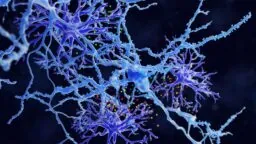 Researchers Identify a New Dementia Target: Researchers have ascertained that excessive amounts of complement C3, an essential immune protein that increases with aging, are responsible for causing dementia in a mouse model.
Researchers Identify a New Dementia Target: Researchers have ascertained that excessive amounts of complement C3, an essential immune protein that increases with aging, are responsible for causing dementia in a mouse model.
The molecular impact of cigarette smoking resembles aging across tissues: This multi-tissue and multi-omic analysis of the effects of cigarette smoking provides an extensive characterization of the impact of tobacco smoke across tissues.
Long-term fasting and its influence on inflammatory biomarkers: A comprehensive scoping review: Results differ based on study design, fasting protocol, participant health status, and inflammatory baseline.
Enhancing active aging through exercise: a comparative study of high-intensity interval training and continuous aerobic training benefits: Future research should focus on longitudinal studies to assess the durability of these benefits and explore combining HIIT and CAT for optimal outcomes.
Coffee Consumption Is Associated With Later Age-at-Onset of Parkinson’s Disease: This relationship appears to be causal, although there is no evidence of an association with Parkinson’s risk or progression.
Green tea consumption and dementia risk in community-dwelling Japanese people aged 40–74 years: Higher consumption of green tea is independently associated with a lower risk of dementia.
Daily low-dose aspirin halves incident type 2 diabetes in elderly subjects with prediabetes: Daily treatment with 100 mg aspirin was associated with approximately a 50% reduction in the incidence of new-onset Type 2 diabetes, but also with an increased risk of gastrointestinal bleeding, in elderly individuals with prediabetes.
Nicotinamide Riboside Supplementation Benefits in Patients With Werner Syndrome: A Double-Blind Randomized Crossover Placebo-Controlled Trial: NR may be beneficial for preventing atherosclerosis, skin ulcers, and kidney dysfunction in patients with Werner syndrome.
Rapamycin, Not Metformin, Mirrors Dietary Restriction-Driven Lifespan Extension in Vertebrates: A Meta-Analysis: Overall, this study suggests that rapamycin and dietary restriction confer comparable lifespan extension across a broad range of vertebrates.
Senotherapy as a multitarget intervention in chronic obesity: In this study, sulforaphane was more broadly effective than the well-known combination of dasatinib and quercetin.
A non-genotoxic stem cell therapy boosts lymphopoiesis and averts age-related blood diseases in mice: These results suggest that non-genotoxic hematopoietic stem cell ransplantation could fundamentally change the clinical management of age-associated hematological disorders
Intrinsic health as a foundation for a science of health: These researchers provide a definition of intrinsic health as a quantifiable property of individuals that declines with age and interacts with context.
News Nuggets
Longevity Manhattan Project Launches: San Francisco, June 20: Viva.city and BerlinHouse have opened Viva Frontier Tower, a 6-week popup village in the newly purchased 16-floor Frontier Tower in downtown San Francisco.
Coming Up
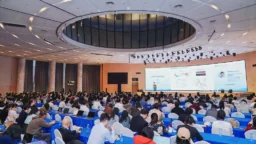 6th TimePie Longevity Forum: As China’s population ages rapidly, the development of the longevity industry has been prioritized to the level of national strategy since 2024. To drive its growth, government policies support a broad spectrum of longevity innovations, ranging from preventive wellness to nutritional supplements.
6th TimePie Longevity Forum: As China’s population ages rapidly, the development of the longevity industry has been prioritized to the level of national strategy since 2024. To drive its growth, government policies support a broad spectrum of longevity innovations, ranging from preventive wellness to nutritional supplements.



